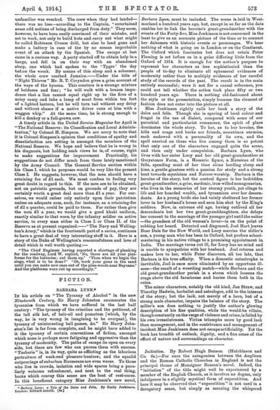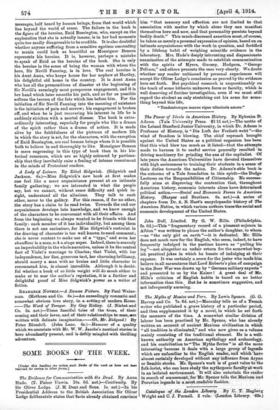Initiation. By Robert Hugh Benson. (Hutchinson and Co. Se.)—For once
the antagonism between the Anglican and the Roman Catholic Churches in England is, not the principal theme of Monsignor Benson's novel. Indeed, the "initiation" of the title might well be experienced by a member of the English Church, as it involves no dogma, only indulgence in a slightly mystical form of superstition. And here it may be observed that "superstition" is not used in a derogatory sense, but simply as meaning the whispered
messages, half heard by human beings, from that world which lies beyond the world of sense. The failure in the book is the figure of the heroine, Enid Beesington, -who, except on-the explanation that she is actually insane, is in her bad moments quite too madly disagreeable to be credible. It is also doubtful whether anyone suffering from a sensitive egotism amounting to mania could look as beautiful as Monsignor Benson represents his heroine. It is, however, perhaps a mistake to speak of Enid as the heroine of the book. She is only the heroine in the sense of being the woman with whom the hero, Sir Nevill Fanning, is in love. The real heroine is his Aunt Anna, who keeps house for her nephew at Hartley, his delightful old home in the country. It is Aunt Anna who has all the premonitions of disaster at the beginning of Sir Nevill's seemingly most prosperous engagement, and it is her hand which later smooths his path, and as far as possible softens the terrors of the fate which lies before him. For the initiation of Sir Nevill Fanning into the meaning of existence is the initiation of pain and sorrow; his engagement is broken off, and when be is just recovering his interest in life he is suddenly stricken with a mortal disease. The book is extra- ordinarily interesting, especially for people who like a drama of the spirit rather than a drama of action. It is made alive by the faithfulness of the pictures of modern life in which the story is set., for the characters, with the exception of Enid Bessington, are real human beings whom it is possible both to believe in and thoroughly to like. Monsignor Benson is more engrossing in this type of book than in his his- torical romances, which are so highly coloured by partisan- ship that they inevitably raise a feeling of intense resentment in the minds of Protestant readers.















































 Previous page
Previous page